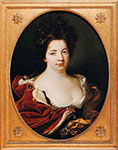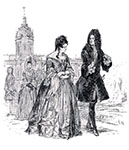Sophie (Sophia) Charlotte (1668-1705)
Electress of Brandenburg (from 1688)
Queen Consort of Prussia (1701-1705)
 |
The portrait at left depicts Sophie Charlotte as Electress of Brandenburg The portrait at right depicts Sophie Charlotte as Queen of Prussia |
 |
Born in 1668, the only daughter of Elector Ernst August (1629-1698) of Hanover, Sophie Charlotte was named after her mother, Sophie (1630-1714), and Sophie's niece, princess Elisabeth Charlotte (1652-1722) of the Palatinate, who was eventually to become, in 1671, the duchess of Orléans. At the age of 16 she married Friedrich (1657-1713), who, as Friedrich III, became elector of Brandenburg in 1688 and, as Friedrich I., became the first king of Prussia in 1701.

In October 1697, Gottfried Wilhelm Leibniz (1646-1716) learned that an astronomical observatory was to be constructed in Berlin as the result of a proposal by the electress Sophie Charlotte. Leibniz, who had long dreamed of an Academy of Sciences within the Germanic nations, wrote to the electress to suggest that the plans for the observatory be widened to embrace an Academy of Sciences like those found in Paris and London. For three weeks in August of the following year, Sophie Charlotte joined Leibniz and her mother Sophie at Linsburg, site of the hunting lodge of the Hanoverian royalty. During this visit Sophie Charlotte invited Leibniz to Berlin to be her friend and teacher, as he had been the friend and teacher of her mother for so many years. She subsequently wrote to him on 1 September 1699, declaring herself a disciple and acknowledging Leibniz's merit. On 19 March 1700, the elector of Brandenburg approved the establishment of an observatory and a Society (later, Academy) of Sciences in Berlin. To mark the occasion, Leibniz was invited to Berlin by the elector, and he stayed as a guest in Sophie Charlotte's palace at Lützenburg (later, Charlottenburg) outside Berlin. Early in June Leibniz sent to Sophie Charlotte, by way of her lady-in-waiting, Henriette Charlotte von Pöllnitz (ca. 1670-1722), a document concerning the real distinction between mind and body, a somewhat simplified version of a similar document that he had written for her mother, Sophie, who had been his philosophical confidant for many years. Leibniz confided to Fräulein von Pöllnitz that the last section of the document he had sent to her, which contained a mathematical analogy, might not be appropriate for the electress Sophie Charlotte. [Later, at the beginning of 1702, and having just returned from a visit to Hanover accompanied by Leibniz, the then queen of Prussia would urgently request his visit at Easter, on the ground that Fräulein Pöllnitz had acquired a book on mathematics which the queen could not decipher without Leibniz's help.] While in Berlin, Leibniz composed a charter for the Society of Sciences, which was ratified by the elector on July 11. On July 12 Leibniz was appointed President of the Society. In September Leibniz left Berlin, bound for Vienna. It was over a year before Leibniz and the queen were to meet once again in Lützenburg in October 1701. Earlier that year the queen had written to Fräulein Pöllnitz, saying:
|

In the brief time allowed them after that, Leibniz and Sophie Charlotte continued to meet as they could—he with her when on visits to Berlin, and she with him when on visits to Hanover; and all along they continued their correspondence. But they last met on 11 January 1705, at Lützenburg, just before the Queen departed for the Carnival in Hanover. While in Hanover the queen became deathly ill; she died tragically of pneumonia on 1 February 1705 at the too-young age of 37. Receiving the news of the queen's death in Berlin on 2 February, Leibniz was broken and consoled himself by writing a long poem in German to the memory of the queen. For her part, the queen remembered Leibniz (and her husband!) in a wonderfully optimistic and light-hearted note written on her deathbed:
Of his grandmother the queen, Frederick the Great of Prussia (1712-1786) wrote:
Sources
Web |





